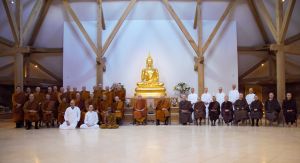Wang Empowerment
Wang (དབང་) or empowerment is a rite introducing a practitioner to tantric or esoteric form of Buddhist practice. It is considered as the tool which ripens or matures (སྨིན་བྱེད་) the mindset of a practitioner for spiritual practice. There are many kinds of wang but one can generally classify them into two. One is called jenang (རྗེས་གནང་), which literally
means giving permission. A lama will give jenang as a permission or an authorisation to visualize a deity and chant mantras associated with the deity. It is not because the practice is off limits to people without permission, but it’s mainly to do with doing the practice correctly.
The second type is a proper wang which again has many types. Wang is a full initiation into the Vajrayana path. It is called wang or empowerment because it empowers the disciple to follow the esoteric Vajrayana path, just as a coronation ceremony empowers the prince to be a king. A wang rite usually has three stages.
In the first preliminary stage, the guru has to meditate, accumulate the mantra of the associated deity for which the wang is given, bless the ground or venue, exorcise the negative forces and then ask the disciples to make preparations and an offering before requesting the wang.
In the actual stage, the lama bestows the wang after the lama and the disciples visualise themselves as a maṇḍala of deities and invites the Buddhas to immerse in them. There are four types of wang a lama normally bestows after this:
Bum wang (བུམ་དབང་) or vase empowerment, sang wang (གསང་དབང་) secret empowerment, sher wang (ཤེར་དབང་) or wisdom empowerment and tshig wang (ཚིག་དབང་) or word empowerment.
During the bum wang, the lama and disciples visualise the vase as a mansion filled with enlightened deities. Then, they visualise the enlightened deities melt into liquid form of enlightened energy and flow down from the vase into the disciples. In the process, the
disciples are cleansed of spiritual impurities. The vase empowerment purifies the disciple of all negativities associated with the body and sows the seeds for the disciple to actualise the trulku (སྤྲུལ་སྐུ་) or emanation body of the Buddha.
In sangwang or secret empowerment, the lama introduces the disciples to secret tantric practice of consuming the secret nectar or semen that is generated by tantric union. This is part of the esoteric techniques of Vajrayāna system to undo ordinary taboos, hang ups and emotional and social prejudices.
Today, to symbolize this, the disciples are given deutsi or sweetened alcohol from a skull cup. If visualised properly, it will cleanse the disciple of impurities associated with speech and help them actualise the longku (ལོངས་སྐུ་) or enjoyment body of the Buddha.
The third sher wang or sherab yeshekyi wang is the wisdom empowerment, which introduces the disciple directly to practice of tantric union by giving them spiritual consorts. It technically empowers the recipient to carry out the practice of sexual yoga as an expedient and speedy
path of spiritual transformation. Symbolically, during this wang, the lama shows a picture of a consort and gives the permission to have a wisdom-partner. Through wisdom empowerment, the impurities of one’s mind are cleansed and one actualises choeku (ཆོས་སྐུ་) or dharma body of the Buddha.
In the fourth tshig wang or word empowerment, the lama uses formulaic words and shows symbols such as crystal or peacock feather to illustrate the nature of the mind. The lama illustrates through the symbol or some other effective
method the nature of the mind – how the mind is empty, luminous, free, open, compassionate and fully enlightened. This empowerment helps one get rid of all the propensities or bakcha (བག་ཆགས་) of impurities and actualise the ngowonyiku (ངོ་བོ་ཉིད་སྐུ་) or innate body of the Buddha.
After being empowered, one is entitled to practice tantric form of Buddhism based on that particular deity and tradition. Every empowerment is connected to a deity and a maṇḍala preceptsentient being, one is r mawers the prince to be a kingal experience of
a practioner. ritual vase onto the palms of thand when one receives empowerments, one receives the authority and entitlement to do the practice based on that deity and mandala. Some empowerment rituals
like that of Kālacakra have more elaborate preliminary steps as part of the vase empowerment while others have additional empowerment through torma representation of deities after the word empowerment. There are also special empowerment rituals associated with [[dharma
protectors]] called srogted or entrusting one’s life. Thus, empowerment practices and procedures can vary depending upon purpose, degree of secrecy and tantric traditions.
In the third phase of the initiation, one has to make offering of maṇḍala or the universe as a token of gratitude to the lama, who will then administer the precepts called samaya or damtshig (དམ་ཚིག་), which is the final part of empowerment ritual.
A wang or empowerment, if properly understood, is a meditation process and one commits to a set of principles and rules to live by. If one violates the samayas, then one is called damnyam (དམ་ཉམས་) or a transgressor and said to go through serious
consequences in the future. If one cannot follow the precepts, it’s better not to receive the wang. Receiving a wang is not an easy matter. Many don’t realise this and rush to get wang but don’t understand the process
or follow the damtshig. Most people only think of receiving the substances distributed during the wang ceremony as wang. Real wang is a mental spiritual process and one takes oath to live by certain norms and rules. For instance, after receiving the four wangs, in almost
all the Vajrayāna Buddhist traditions, one cannot hate someone or mistreat a woman. If one hates a sentient being, one breaks a damtshig precept. The whole point of receiving empowerment is to enter a path with strict spiritual regime to gain enlightenment swiftly. Receiving an empowerment is said to also bring temporary worldly benefits such as enhanced charisma, health and long life.
